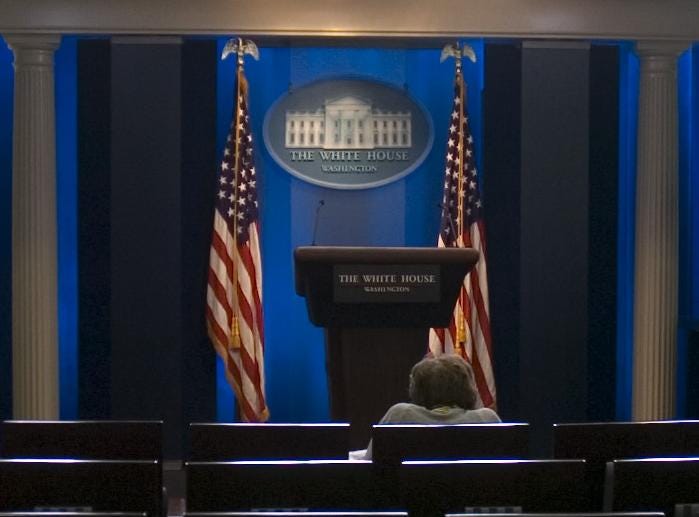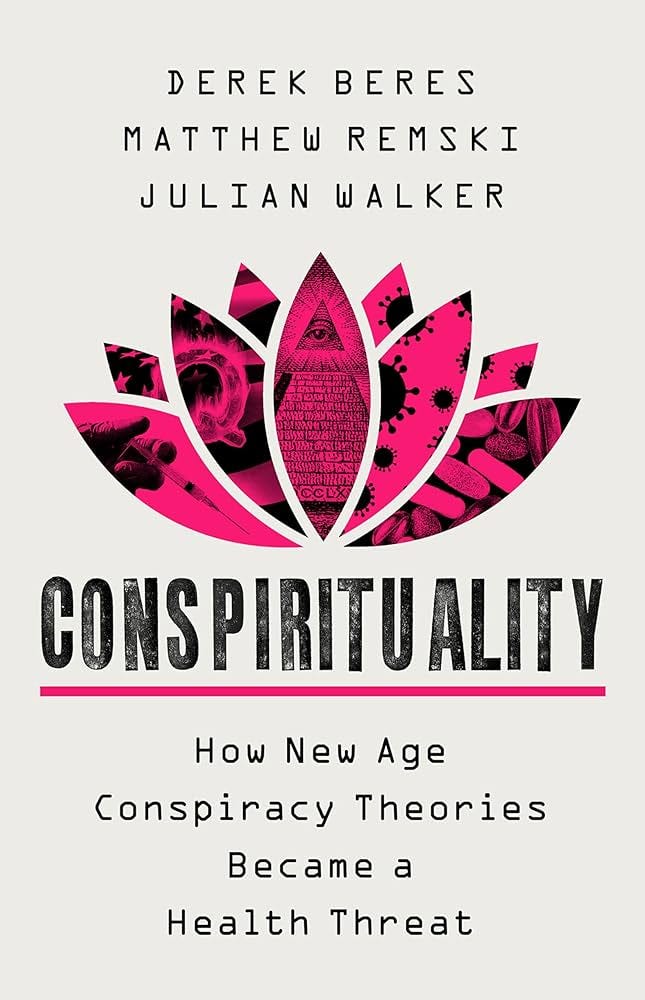The 202nd Block: Truth, trust, and Helen Thomas
No, I will not talk about Katespiracy... yet
This week…
Your reading time is about 8 minutes. Let’s start.

Consider this the second part of the Block’s IWD edition. I want to introduce you to the late Helen Thomas, a US-born journalist of Arab descent, whose father’s last name was anglicised when her parents immigrated to the US from Lebanon. She rejected the hyphenated identity of an Arab-American, believing that immigrants who assimilated in totality, like her family, should not be designated this way. This would come under some scrutiny later in her professional conduct.
Born in 1920, she joined the United Press (later known as the United Press International or UPI in 1958) in 1943, when it was one of the “Big 4” newswire services in the world, alongside AP, Reuters, and AFP. She became a White House correspondent for UPI in 1961 and covered the administrations of ten U.S. presidents, from the Kennedy administration to the Obama administration. She was the only woman in a room of white men for many years.
By 1975, she became the first woman to be admitted to the White House Press Corps. She also became the only Press Corps member to have an assigned seat in the White House Briefing Room, while other seats bear the names of news organisations, not journalists. She sat in the front row and asked the first question during White House press conferences. Everybody knew the drill.
Things changed in May 2000. The UPI was acquired by News World Communications Inc., a media company founded by the Unification Church leader Sun Myung Moon. For the uninitiated, Moon claimed to be the Messiah and the Second Coming of Christ, compared gay people to “dirty dung-eating dogs,” and was a proponent of “automatic theocracy.” After 57 years with UPI, Thomas resigned on May 17, 2000. Leading up to the change in ownership, the UPI was already in a state of decline, but working for the controversial new owners was, she considered, a step too far.
Less than two months after her UPI resignation, she became an opinion columnist for Hearst Newspapers, writing on the White House and national affairs, and she remained present in the White House press room—as a columnist in a reporter’s place. When she turned 89 on August 4, 2009, President Barack Obama, who shares the same birthday, started the day’s press conference by presenting her with birthday cupcakes and singing Happy Birthday.
A year later, Rabbi David Nesenoff, who was at the White House for the American Jewish Heritage Celebration Day on May 27, 2010, stopped Thomas for a short conversation as she was leaving the grounds. The rabbi asked her for a comment on Israel, to which she replied, “Tell them to get the hell out of Palestine.”
“Remember,” she said, “these people are occupied and it’s their land.”
This would be her ultimate downfall. Not the hundreds of times she challenged presidents with opposition, such as George W. Bush, whom she pressed about the War in Iraq: “I'd like to ask you, Mr. President, your decision to invade Iraq … Every reason given, publicly at least, has turned out not to be true. My question is: Why did you really want to go to war? … You have said it wasn’t oil … it hasn’t been Israel, or anything else. What was it?” Or to Obama, to whom she demanded, “When are you going to get out of Afghanistan? … Why are we continuing to kill and die there? What is the real excuse?”
Even Fidel Castro had an opinion about her, reportedly saying that the difference between democracy in Cuba and democracy in the United States is that he didn’t have to answer questions from Helen Thomas.
Her agency, Nine Speakers, Inc., subsequently dropped her as a client. On June 7, 2010, she tendered her resignation from Hearst. In an October 2010 interview with Scott Spears on WMRN, Thomas said she knew as soon as she made the statement that she would lose her job. “You cannot criticise Israel in this country and survive,” she said. Even though she did issue an apology, she did so because people were upset but ultimately, she said, she stood by her feelings about Israel’s aggression and brutality. She continued to double down on this in later public speeches and interviews.
In response, the Anti-Defamation League called for journalism schools and organisations to rescind any honours given to her. At least one university discontinued a media award named after her, while the Society of Professional Journalists retired an award named for Thomas. But she also received some support. Nicholas Benton, the owner and editor of the Virginia Falls Church News-Press employed her as a columnist from January 2011 to Jan 2012.
Thomas died on July 20, 2013, at her home in Washington, D.C. at 92. I would like to think she would have been more widely celebrated as a trailblazer had it not been tempered by what her detractors considered stubborn and contrarian views. However, her questioning of the “Obama War”, then considered hostile, is now barely seen to be problematic. Meanwhile, her opinion on Israel, while still divisive to the majority in the West today, could one day be of little controversy.
The information above is extracted from the following Wikipedia pages: Helen Thomas, Sun Myung Moon, and UPI.
And now, a selection of top stories on my radar, a few personal recommendations, and the chart of the week.
ICYMI: The Previous Block recommended eight books from women who write about the effects of Big Tech on data, disinformation, and democracy. CORRECTION NOTICE: None notified. REGULATIONS AND CENSORSHIPS
The TikTok ban is all about preserving US power
Paris Marx for Disconnect:
In Western discourses, China’s internet policies are often positioned solely as attempts to limit the freedoms of Chinese people — and that can be part of the motivation — but it’s a politically convenient explanation for Western governments that ignores the more important economic dimension of its protectionist approach. Chinese tech is the main competitor to Silicon Valley’s dominance today because China limited the ability of US tech to take over the Chinese market, similar to how Japan and South Korea protected their automotive and electronics industries in the decades after World War II. That gave domestic firms the time they needed to develop into rivals that could compete not just within China, but internationally as well. And that’s exactly why the United States is so focused not just on China’s rising power, but how its tech companies are cutting into the global market share of US tech giants.
Loosely linked:
Once more with feeling: Banning TikTok is unconstitutional and won’t do shit to deal with any actual threats by Mike Masnick for Techdirt.
Google restricts AI chatbot Gemini from answering queries on global elections by Zaheer Kachwala for Reuters.
YouTube blocks access to Fifth Estate story on killing of B.C. Sikh activist at India’s demand by Mark Gollom for CBC.
TRUST IN NEWS
Mona Chalabi on storytelling, the power of data, and covering Palestine
Cath Virginia for The Verge:
“It’s funny how a lot of people viewed me as a rigorous journalist on every other topic. And when it came to [covering Palestine], all of a sudden there was this disbelief in my method of research. There was this suspicion that all of a sudden it wasn’t rigorous. I think that really, really speaks to the very, very, very deeply entrenched biases that exist around this subject.
“There’s this notion that Palestinian narratives are not as reliable and should be treated with caution. I hope that it’s finally kind of starting to shift a little bit.”
Loosely linked:
People trust themselves more than they trust the news by Jacob L. Nelson, Zeve Sanderson, and Seth C. Lewis for CJR.
Melissa Heikkilä: “Journalists are feeding the AI hype machine” by David Silverberg for BBC.
Kara Swisher is promoting her memoir with tech bros by Nitish Pahwa for Slate.
SCAM FARMS
Photographer steps inside Vietnam’s shadowy ‘click farms’
Bibek Bhandari for CNN:
Some had a traditional setup with hundreds of manually operated phones, while others used a newer, compact method called “box farming” — a phrase used by the click farmers Jack Latham visited — where several phones, without screens and batteries, are wired together and linked to a computer interface.
Latham said one of the click farms he visited was a family-run business, though the others appeared more like a tech companies. Most workers were in their 20s and 30s, he added.
“They all looked like Silicon Valley startups,” he said. “There was a tremendous amount of hardware … whole walls of phones.”
Loosely linked:
Hundreds rescued from love scam centre in the Philippines by Virma Simonette and Kelly Ng for BBC.
Crypto scammers flooded YouTube with sham SpaceX Starship livestreams by Andrew Paul for PopSci.
Refund fraud schemes promoted on TikTok, Telegram are costing Amazon and other retailers billions of dollars by Annie Palmer for CNBC.
What I read, listen, and watch…
I’m reading Conspirituality (2023) by conspirituality survivors Julian Walker, Derek Beres, and Matthew Remski who document the intersections of alt-health practitioners with far-right conspiracy trolls.
I’m listening to an episode of Citations Needed where Jon Schwarz joined Nima Shirazi and Adam Johnson to explain why The Atlantic sucks.
I’m watching CTV’s W5 documentary on the ‘Queen’ of Canada, Romana Didulo.
I’m also watching a documentary by Radio-Canada’s Rad that follows a group of Quebec newcomers learning French in a francisation class for six months. Some dropped out, some had to retake the first level, but there’s always that one student whose progress was most impressive.
Other curious links, including en español et français:
Bollywood ‘takeover’: Pro-Modi films swamp Indian voters ahead of election by Kunal Purohit for Al Jazeera.
Online opt-in polls can produce misleading results, especially for young people and Hispanic adults by Andrew Mercer, Courtney Kennedy, and Scott Keeter for Pew Research Center.
Whistleblowing while Black: How truth-telling changes the careers of Black women in tech by Ese Olumhense for The Markup.
Women's fertility is more complicated than you might have heard by Amanda Ruggeri for BBC. That’s what I said (#191).
No one should see a chiropractor thinking they are seeing a doctor by Ranjana Srivastava for The Guardian. I can’t believe a ghost inspired this legitimised practice. 👻
Los nativos digitales no nacen, se hacen: hacia una sociedad de eruditos digitales por Nuria Oliver en El País.
Yo tengo otros datos (filtrados) por Pepe Flores en Gatopardo.
La communauté tricot et crochet se mobilise contre les arnaques à l’intelligence artificielle ($) par Hugo Ruher dans Le Monde.
Entre influenceurs et journalistes, une méfiance tenace par Vincent Manilève dans La revue des médias.
Chart of the week
For Statista, Florian Zandt illustrated the growth of AI-powered fraud based on Sumsub Identity Fraud Report 2023.
And one more thing
Live, laugh, love.





Aww! I was looking forward to your newsletter this week to read about your take on Katespiracy, especially on privacy vs transparency for public figures. It still boggles me how the doctored photo "shook the nation".
Also, what a great write up about Helen Thomas!